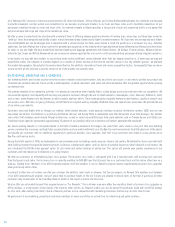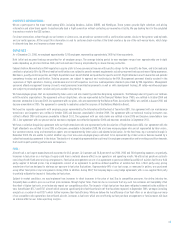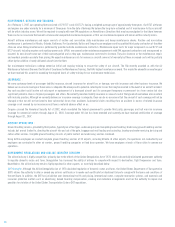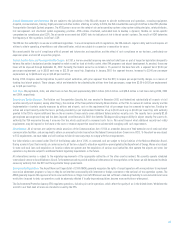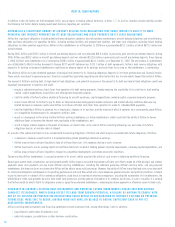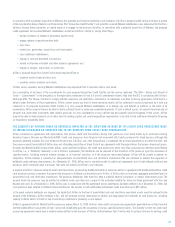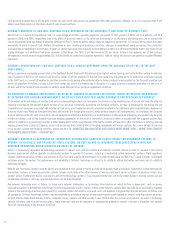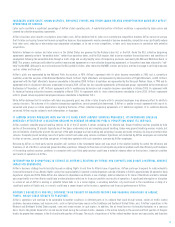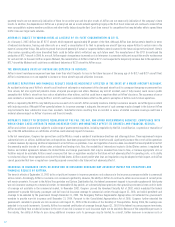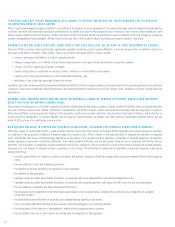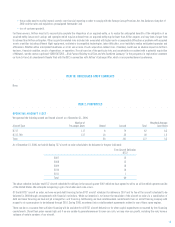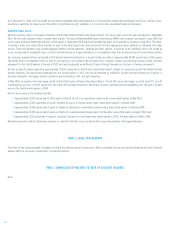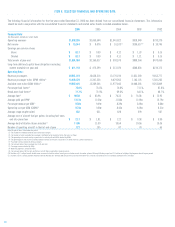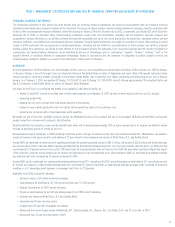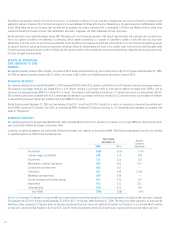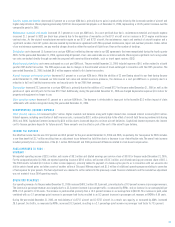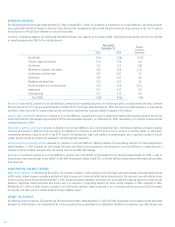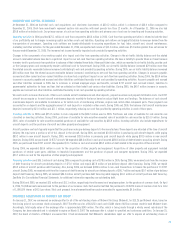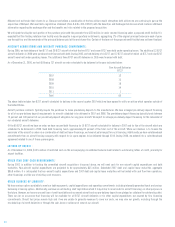Airtran 2006 Annual Report Download - page 20
Download and view the complete annual report
Please find page 20 of the 2006 Airtran annual report below. You can navigate through the pages in the report by either clicking on the pages listed below, or by using the keyword search tool below to find specific information within the annual report.
IF AIRTRAN LOSES KEY SENIOR MANAGEMENT OR IS UNABLE TO ATTRACT AND RETAIN THE TALENT REQUIRED FOR ITS BUSINESS,
ITS OPERATING RESULTS COULD SUFFER.
AirTran’s performance depends largely on the efforts and abilities of its members of senior management. These executives have substantial experience and expertise
in AirTran’s business and have made significant contributions to its growth and success. The unexpected loss of services of one or more of these individuals could
have an adverse effect on AirTran’s business. AirTran will need to attract and retain additional qualified personnel and develop, train and manage an increasing
number of management-level employees. AirTran cannot assure you that it will be able to attract and retain personnel as needed in the future.
AIRTRAN’S STOCK PRICE MAY FLUCTUATE SIGNIFICANTLY AND YOU COULD LOSE ALL OR PART OF YOUR INVESTMENT AS A RESULT.
The price of AirTran common stock may fluctuate significantly, regardless of whether or not it acquires Midwest, as a result of many factors in addition to the factors
discussed in the these risk factors. These factors, some or all of which are beyond AirTran’s control, include:
•actual or anticipated fluctuations in AirTran’s operating results;
•changes in expectations as to AirTran’s future financial performance or changes in financial estimates of securities analysts;
•success of AirTran’s operating and growth strategies;
•investor anticipation of competitive and industry threats, whether or not warranted by actual events;
•operating and stock price performance of other comparable companies; and
•realization of any of the risks described in these risk factors.
In addition, the stock market recently has experienced extreme volatility that often has been unrelated or disproportionate to the operating performance of particular
companies. These broad market and industry fluctuations may adversely affect the trading price of AirTran common stock, regardless of AirTran’s actual operating
performance.
AIRTRAN’S ANTI-TAKEOVER PROVISIONS MAY DELAY OR PREVENT A CHANGE OF CONTROL OF AIRTRAN, WHICH COULD ADVERSELY
AFFECT THE PRICE OF AIRTRAN COMMON STOCK.
The existence of some provisions in AirTran’s corporate documents and Nevada law may delay or prevent a change in control of AirTran, which could adversely affect
the price of AirTran common stock. AirTran’s certificate of incorporation and AirTran’s bylaws contain some provisions that may make the acquisition of control of
AirTran more difficult, including provisions relating to the nomination, election and removal of directors, the structure of the board of directors, and limitations on
actions by AirTran shareholders. In addition, Nevada law also imposes some restrictions on mergers and other business combinations between AirTran and any
holder of 10% or more of its outstanding common stock.
RISK FACTORS RELATING TO AIRTRAN AND POTENTIAL ACQUISITIONS, INCLUDING THE POTENTIAL ACQUISITION OF MIDWEST.
AirTran has sought to acquire other carriers, as well as gates and other assets from other carriers. In the event AirTran completes one or more acquisitions including,
or in addition to, the acquisition of Midwest, it may be subject to a variety of risks. AirTran intends, to the extent possible, to integrate the operations of acquired
assets and entities with those of AirTran Airways. Depending on the nature of the acquired entity or operations, integration of acquired operations into AirTran’s
present operations may present substantial difficulties. Even where material difficulties are not anticipated, there can be no assurance that AirTran will not
encounter such difficulties in integrating acquired operations with AirTran’s operations, which may result in a delay or the failure to achieve anticipated synergies,
increased costs and failures to achieve increases in earnings or cost savings. The difficulties of combining the operations of acquired companies may include,
among other things:
•possible inconsistencies in standards, controls, procedures and policies, business cultures and compensation structures between AirTran and an acquired
entity;
•the consolidation of sales and marketing operations;
•the retention of existing customers and attraction of new customers;
•the retention of key employees;
•employee strikes and other labor-related disruptions in connection with union representation and seniority integration issues;
•employee strikes and other labor-related disruptions in connection with seniority questions with respect to both union and non-union employees;
•the consolidation of corporate and administrative infrastructures;
•the integration and management of the technologies and products of the acquired entity, including the consolidation and integration of computer
information systems;
•the identification and elimination of redundant and underperforming operations and assets;
•costs associated with the termination of the assumed contractual obligations and the timing thereof;
•the minimization of the diversion of management’s attention from ongoing business concerns;
•the possibility of tax costs or inefficiencies associated with the integration of the operations;
14


